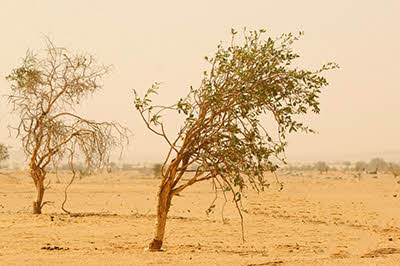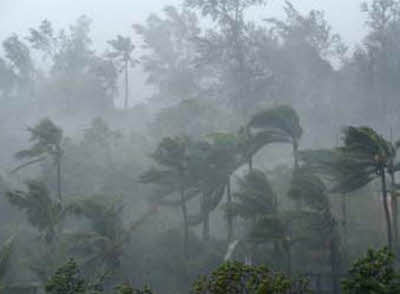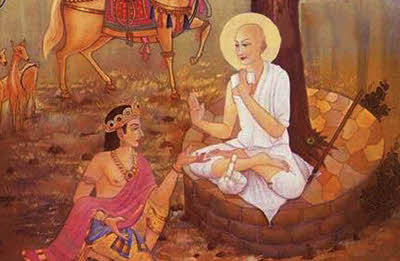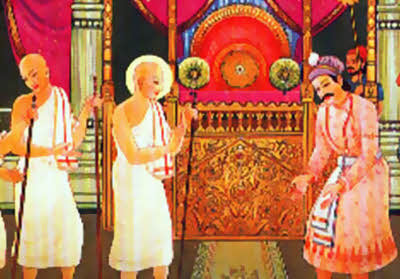
Dhana made a march day by day like the sun, looked for by all the people with wide-open eyes. At that time, it was the fiery summer season terrible to travelers, diminishing the water of the ponds and rivers, as well as shortening the nights. Winds that were like fires, thoroughly unbearable, blew, and the sun spread its heat that was like a mass of fire on all sides. The members of the caravans stopped at every tree near a pond and, having entered every water-dispensary, drank much water, and fell (on the ground). The buffaloes tongues hung out, as if impelled by breathing, and disregarding whips, they entered the mud of the rivers. The oxen, too, ignored their drivers, and even if the whips were falling, at every opportunity they went to trees off the road. Bodies melted completely, like balls of wax, from the sun’s rays which were like hot needles. The sun assumed the full role of a hot plough-share, and the dust had the unbearableness of a dung-fire thrown on the road. The young women of the caravan entered the streams on the way, everywhere, and put on their necks lotus-stalks they had pulled up. The matrons of the caravan looked just as if they were wearing wet clothes (to keep cool) on the road, because of their garments wet from perspiration. The travelers alleviated the fatigue caused by the heat by fans made from the leaves of the palasa, palmyra-palm, date-palm, lotus, and plantain.
Then arrived the season characterized by clouds that terminated the movements of travelers as well as the duration of the summer. With terror the caravan saw a cloud in the sky that was like a demon holding a bow and discharging arrows in the shape of rain. The cloud, repeatedly brandishing lightning like a firebrand, terrified the travelers very much, as if they were children. River-banks at once gave way, like the hearts of the travelers, from the high floods of the rivers pouring forth. All the high and low ground of the earth was made level by the waters. Alas! What discrimination can there be in the rise to prosperity of fools? As a result of the impassability of the road from the water, thorns, and mud, two miles seemed like eight hundred. Travelers advanced very slowly, sunk into new mud up to the knees as if they had put on boots.

Long clubs of her own arms, as it were, were extended by an evil fate in the guise of rivers to obstruct travelers on every road. The carts mired everywhere in the terrible mud on the road, as if seized by the earth from anger at her long crushing. The camels, led by ropes by their riders who had dismounted, slipped at every step and fell on the road. When the merchant Dhana noticed the impassability of the road, he stopped and made a camp at that very place in the forest. The people made thatched huts there to pass the rainy season. “For people who act according to time and place never suffer. The Suri with the sadhus dwelt in a thatched hut as an upassraya on ground free from lives pointed out by Manibhadra. Because of the size of the caravan and the length of the rainy season, everyone’s provisions, barley, etc., gave out. Then the members of the caravan, afflicted by hunger, went here and there to eat bulbs, roots, etc., lagged like ascetics. At the beginning of night, the miserable plight of the caravan was fully described to its leader by his friend Manibhadra. Then the merchant remained in continuous thought about the caravan’s trouble, motionless as the Ocean undisturbed by wind. Then in a moment sleep came to him worn out by anxiety. For excessive grief and excessive happiness are its chief causes.
During the last watch of the night, a certain stable-watchman, sincere at heart, recited as follows: “Our Master, whose fame has spread in every direction, keeps his promises even though he has suffered misfortune. He surely does!” When Dhana heard that, “He thought,” Someone is ridiculing me. Who can it be? Who in my caravan here is especially unfortunate? Oh, I know. The Acharya Dharmaghosa came with me. He lives only on alms that have not been made, nor caused to be made (for him) and are pure. Now when the whole caravan is destitute, how does he, who does not touch bulbs, roots, fruit, etc., live? Only today have I thought of him whom I led and for whom I assumed responsibility on the road. What have I, thoughtless, done? How can I show my face to him today, to whom as yet no service, not even in words, has been done? Nevertheless, I will see him today and wash away my sin. What business has he, indifferent to everything, with me?” To him, engaged in these reflections and eager for the sight of the Suri, the fourth watch of the night seemed like another night.
When it was dawn, Dhana with the chief persons (of the caravan), dressed in white and wearing ornaments, went to the Suri’s retreat which was situated on high, dry ground free from lives, covered with a roof of palasa, with walls of straw with crevices. Dhana saw the Muni Dharmaghosa, like the churning-stick of the Ocean of evil, like a road to emancipation, like an assembly-hall of Dharma, like an abode of Splendor, a hoar-frost for the bush of passions, a carrier of the wealth of happiness, a wonderful ornament of the Jain congregation, a wishing tree for people desiring emancipation, like penance concentrated in a mass, like the scriptures embodied, like a Tirthankaras. He saw munis there, some engaged in meditation, some absorbed in silence, some engaged in kayotsarga some were reading aloud the scriptures, some were teaching, some sweeping the ground, some paying homage to their gurus, some discoursing on Dharma, some expounding texts, some giving their approval (of the exposition), and some reciting the tattvas (supreme principles). He paid homage to the Acharya and the sadhus in turn, and they gave him the greeting of dharmalabha, the destroyer of evil.

Then he seated himself at the Acharya’s lotus feet, like a kinggoose, and penetrated with joy, began to speak thus: “When I invited you to go with me, O Blessed One, I showed zeal which was quite useless, like the thundering of clouds in autumn. From that time on, I never asked you, nor paid my respects to you, nor aided you at any time with food*, drink, clothes, etc. What have I done in my confusion, asleep though awake, since I, forgetful of my promise for a long, long time, have neglected you! Forgive my careless conduct, O Blessed One. For the great, like the earth, always bear everything.” The Suri said, “Have you indeed not aided me by protection from wild beasts and robbers on the road? Your own caravan has given me suitable food, drink, etc. Therefore, we lacked nothing. Do not worry, Dhana replied, “The good always see only good qualities. So to me, though I am sinful, Your Reverence speaks thus. I am completely ashamed of my own negligence. Please send sadhus so I can bestow food, as I desire.” The Suri said, “You know that it will be according to circumstances. Food, etc., that has not been made, nor caused to be made, and is free from life, is suitable for us.” “I shall give to the sadhus only that which is suitable,” Dhana said, bowed, and went to his own abode.

Then just behind him came two sadhus, and by chance there was nothing, food, drink, etc., suitable for them. Searching here and there, the merchant himself saw some fresh ghee, pure as his own heart. “Here is something suitable,” the caravan-chief said. Saying, “I accept it,” the sadhu held out his bowl. Thinking, “I am blessed, I have done my duty, I am virtuous,” with the hair on his body erect from pleasure, he himself gave the ghee to the sadhu. After the gift of ghee had been made, Dhana paid homage to the munis, making grow his bulb of merit, as it were, with the water of the tears of joy. They bestowed ‘dharmalabha’ equal to a perfect charm for the accomplishing of all happiness, and went to their retreat. At that time, by the power of his gift the seed of the tree of moksa, the seed of enlightenment, Samyak Darshan* difficult to gain, was acquired by the merchant. At night he went again to the munis’ abode, entered, bowed to the guru, saying, “Instruct me.” The Suri Dharmaghosa gave this sermon, almost equal to that of a Shrut-Kevali, in a voice like thunder.











No comments yet.
Leave a comment